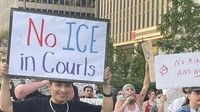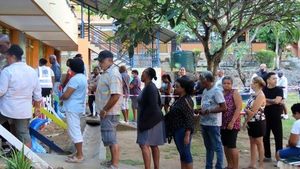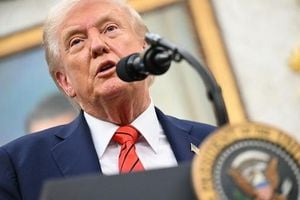On a brisk October morning in Chicago’s Lincoln Square neighborhood, what began as a routine day for WGN news producer Debbie Brockman took a dramatic turn. As she worked on a story, Brockman suddenly found herself at the center of a national debate on press freedom, immigration enforcement, and the role of law enforcement in American democracy. Her arrest by federal agents—captured on video and widely circulated—has ignited a firestorm of criticism, legal scrutiny, and calls for reform from journalists, activists, and civil rights organizations across the country.
Brockman, a respected veteran at WGN-TV, has long been known for her dogged commitment to investigative journalism and her unwavering pursuit of the truth. According to USA TODAY, on October 10, 2025, she was detained by federal Border Patrol agents during an immigration enforcement operation. Video footage reveals masked agents holding her face down in the street, handcuffing her, and placing her in an unmarked gray Chrysler minivan with tinted windows, as onlookers protested and filmed the scene. In the midst of the chaos, Brockman identified herself as a WGN employee and asked a bystander to inform her employer, a moment that underscored her professionalism and awareness of her rights.
The Department of Homeland Security (DHS) quickly issued a statement. Tricia McLaughlin, assistant secretary of public affairs at DHS, claimed that Brockman, an American citizen, had “thrown objects” at a Border Patrol vehicle during the operation. She was accused of assault on a federal law enforcement officer, though WGN later confirmed that Brockman was released without charges. The statement from WGN, while withholding her name for privacy, acknowledged the incident and pledged to gather all relevant facts.
Eyewitnesses offered a different perspective. Josh Thomas, a local resident who saw the arrest unfold, reported, “They said they were detaining her for obstruction. She said, ‘I didn’t obstruct.’” The footage, which shows Brockman pinned and handcuffed, has become a focal point for those concerned about the growing tensions between journalists and federal agencies, especially in the current climate of heightened immigration enforcement.
The timing of Brockman’s arrest is particularly notable. Just one day before the incident, a federal judge in the Northern District of Illinois issued a temporary restraining order against federal agents targeting journalists covering protests. The order, which also protected protesters and religious practitioners not posing an immediate threat, was a direct response to a series of controversial enforcement actions in Chicago—including the use of pepper balls against a journalist and a priest. According to USA TODAY, this legal backdrop has fueled speculation about whether Brockman’s arrest was part of a broader pattern of intimidation against the press.
Chicago has been a flashpoint for immigration enforcement under the Trump administration’s Operation Midway Blitz, a campaign that has seen a marked increase in federal activity and aggressive tactics. President Donald Trump’s decision to deploy the National Guard to Illinois, citing clashes between federal agents and protesters, has been hotly contested by state officials. Illinois leaders have challenged the deployment in court, arguing that it is unwarranted and exacerbates tensions rather than resolving them.
The arrest of Brockman is not an isolated event. It comes on the heels of another major legal development: On October 7, 2025, a federal judge ruled that the warrantless arrests of 11 immigrant restaurant workers at El Potro Mexican Café in Liberty, Missouri, earlier in the year violated a 2022 consent decree. The judge, Jeffrey I. Cummings of the U.S. District Court for the Northern District of Illinois, ordered ICE to lift conditions on the release of 22 immigrants, including those detained after the Liberty raid, and extended the consent decree to February 2, 2026. The ruling also requires the Department of Homeland Security to reissue its warrantless arrest policy nationwide, retrain officers who violated the decree, and report monthly on warrantless arrests in the region.
Rekha Sharma-Crawford, a Kansas City-based immigration attorney representing the Liberty workers, hailed the decision as a significant victory for due process. “Their deportation cases, at least for the time being, would have to be dismissed because they were all arrested unlawfully,” she told The Beacon. The case, brought by the National Immigrant Justice Center and the Roger Baldwin Foundation of the ACLU of Illinois, underscores the ongoing legal battles over immigration enforcement and constitutional rights.
Michelle Garcia, Deputy Legal Director for the ACLU of Illinois, emphasized the broader implications: “Today’s decision makes clear that DHS and ICE—like everyone else—must follow the Constitution and the law. The federal government’s reckless practice of stopping, harassing, and detaining people—and then finding a justification for the action must end.”
For many in Chicago and beyond, the arrest of Debbie Brockman has become a rallying point. Civil rights organizations and journalism advocates have called for greater oversight of ICE and Border Patrol operations, as well as robust protections for journalists on the front lines. The Chicago Headline Club, one of the organizations that requested the federal restraining order, has yet to issue a statement specifically on Brockman’s case, but the incident has amplified calls for accountability and reform.
Advocates for immigrant rights, such as Advocates for Immigrant Rights and Reconciliation (AIRR), have responded by ramping up “know-your-rights” training sessions in the region. More than 3,000 people in the Kansas City area have participated, learning how to document federal raids and ensure that law enforcement complies with the law. AIRR stresses the importance of witnesses filming agents during raids, not just to protect immigrants but to safeguard the rule of law itself.
The events of October 2025 have highlighted the precarious position of journalists covering contentious issues like immigration enforcement. The chilling effect of aggressive law enforcement tactics, coupled with the threat of arrest or violence, has raised alarms about the future of press freedom in the United States. As civil liberties groups continue to demand answers and legal remedies, the story of Debbie Brockman serves as a potent reminder of the risks faced by those who seek to hold power to account.
In the end, the uproar over Brockman’s arrest is about more than one journalist or one city. It’s a test of the nation’s commitment to constitutional principles, the independence of the press, and the rights of all individuals—regardless of citizenship status—to due process and protection under the law. The outcome of this debate will shape not only the future of immigration enforcement but the very foundation of American democracy.




